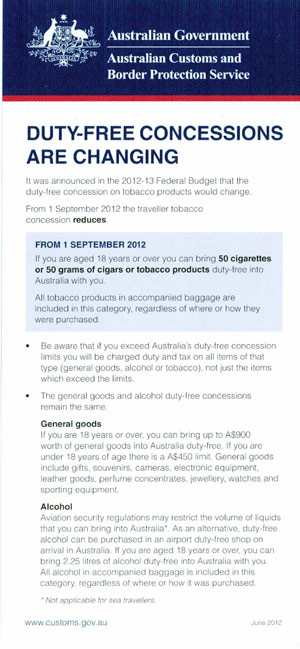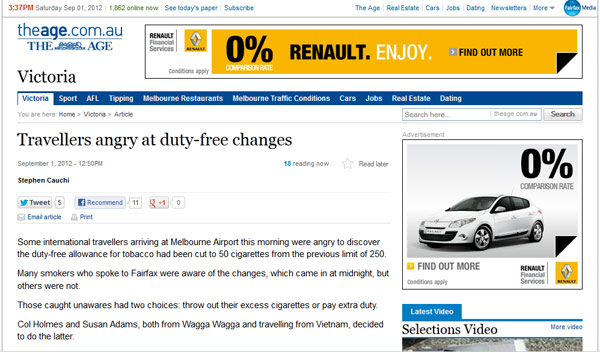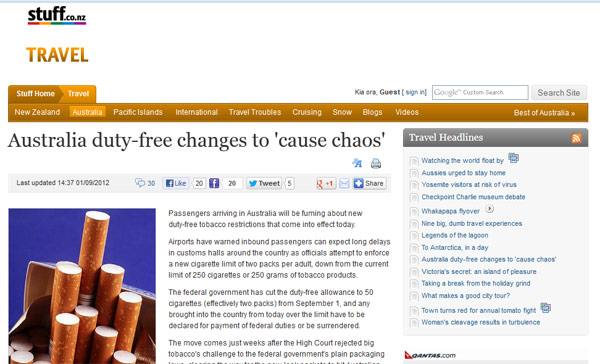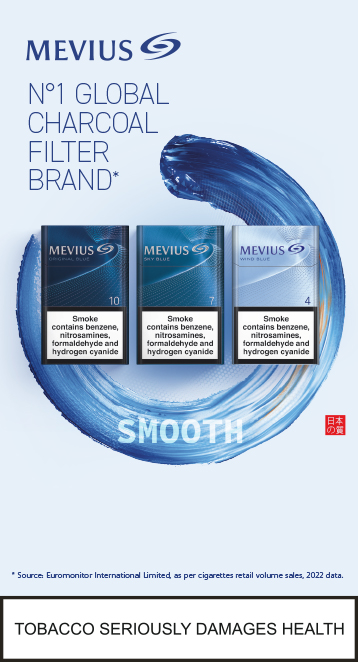AUSTRALIA. Inbound travellers have faced lengthy queues and product seizures as the country’s sharply reduced tobacco allowances took effect today.
From today, 1 September, the new limit is 50 cigarettes or 50 grams of tobacco, compared to 250 cigarettes or 250 grams of tobacco formerly.
The news has major commercial repercussions not only for travel retailers in Australia whose Arrivals business will be hit badly but for any overseas airport (or airline) serving Australia-bound traffic.
The regulatory change – due to both its severity and short lead time – represents one of the most fundamental changes to airport retail trading conditions in industry history. Effectively 80% of Arrivals duty free sales of a core category (and one that is a critical driver of cross-category purchases) have been wiped out overnight. The same percentage applies to sales of tobacco to Australia-bound passengers by overseas airport retailers who enforce the allowance limit (see below for more comment on that point).
Many Australians travelling on short trips abroad, too, will be loath to buy their full duty free allowance on departure as in the past.
 |
This information pamphlet is designed to educate Australian travellers but what about those coming in from overseas? |
The Australian Airports Association (AAA) had unsuccessfully urged the government to postpone the changes until next March, citing significant pressure on airport infrastructure and lack of awareness among travellers.
Based on reaction in local media today, those fears are coming true. The Sydney Morning Herald warned of long delays in airport customs halls as officials attempt to enforce the new limit.
“Where there’s smoke, there’s bound to be ire,” read the headline in The Australian. “Travellers angry at duty free changes,” said the headline in national newspaper The Age.
It reported: “Some international travellers arriving at Melbourne Airport this morning were angry to discover the duty-free allowance for tobacco had been cut to 50 cigarettes from the previous limit of 250. Many smokers who spoke to [media owner] Fairfax were aware of the changes, which came in at midnight, but others were not. Those caught unawares had two choices: throw out their excess cigarettes or pay extra duty.”
Typical consumer reaction came from Col Holmes and Susan Adams, both from Wagga Wagga and travelling from Vietnam. “We had to pay A$157 for cigarettes we bought off the street in Vietnam,” Holmes told the newspaper. “The first we heard of it was today when we were told we were allowed only two packets. It’s getting ridiculous. There should be a grace period to let everyone get acclimatised to it.”
Ms Adams said that when they left for Vietnam six weeks ago they hadn’t seen any publicity about the change. “We were not notified, we knew nothing about it,” she said. “When we flew out we didn’t see or hear anything. We assumed we could bring in a litre of grog each and a carton of cigarettes each. Why wasn’t it advertised on TV or in the paper … we read the paper every day. We’re not happy.”
While those were street purchases, more damaging to the travel retail industry will be cases where Australia-bound travellers buy their tobacco duty free and have it seized upon arrival (or have to pay the duty). With an estimated 70 countries offering direct flights to Australia the task of educating shop staff in duty free shops abroad is a huge one and it is (unfortunately) probable that at least some travel retailers in those locations will not see it as their obligation to inform Australia-bound passengers of the reduced allowances.
In a statement that hardly enhances the reputation of the industry worldwide, AAA Chief Executive Caroline Wilkie said: “We have been advised overseas-based duty free retailers will not advise those travelling to Australia of the changes to allowances, as they will lose sales.” [Such a sweeping verdict is almost certainly inaccurate as most international airport retailers take a highly responsible approach to monitoring allowances. But, as stated above, there will be exceptions, either by will or by ignorance – Ed].
 |
Local media coverage talks of consumer confusion and annoyance |
“We know there will be no advertising of the change in China until November – two months after the restriction starts – and China is one of the highest tobacco user countries in the world,” Ms Wilkie told local reporters.
“We know the education campaign will not begin overseas until September 1 and will not involve radio, television or newspapers. Consequently people will arrive from other countries with no knowledge of this new restriction.”
The situation is set to cause chaos in arrivals, she warned.
“This is the perfect storm waiting to happen and in the long term it is Australia’s tourism industry that will face the damage,” Ms Wilkie said.
We’ll bring you feedback from the situation on the ground in Australian airports during the coming week.
 |
The story is also big news across the Tasman in New Zealand |











